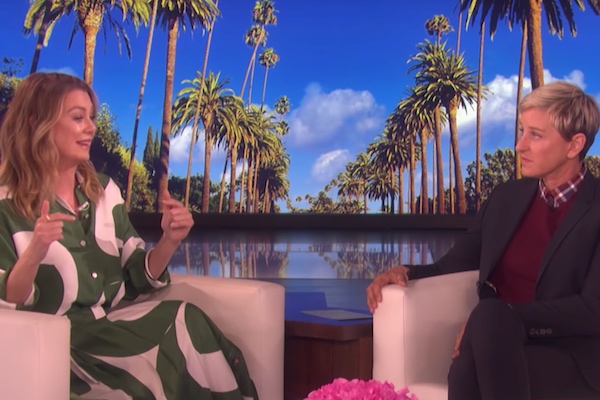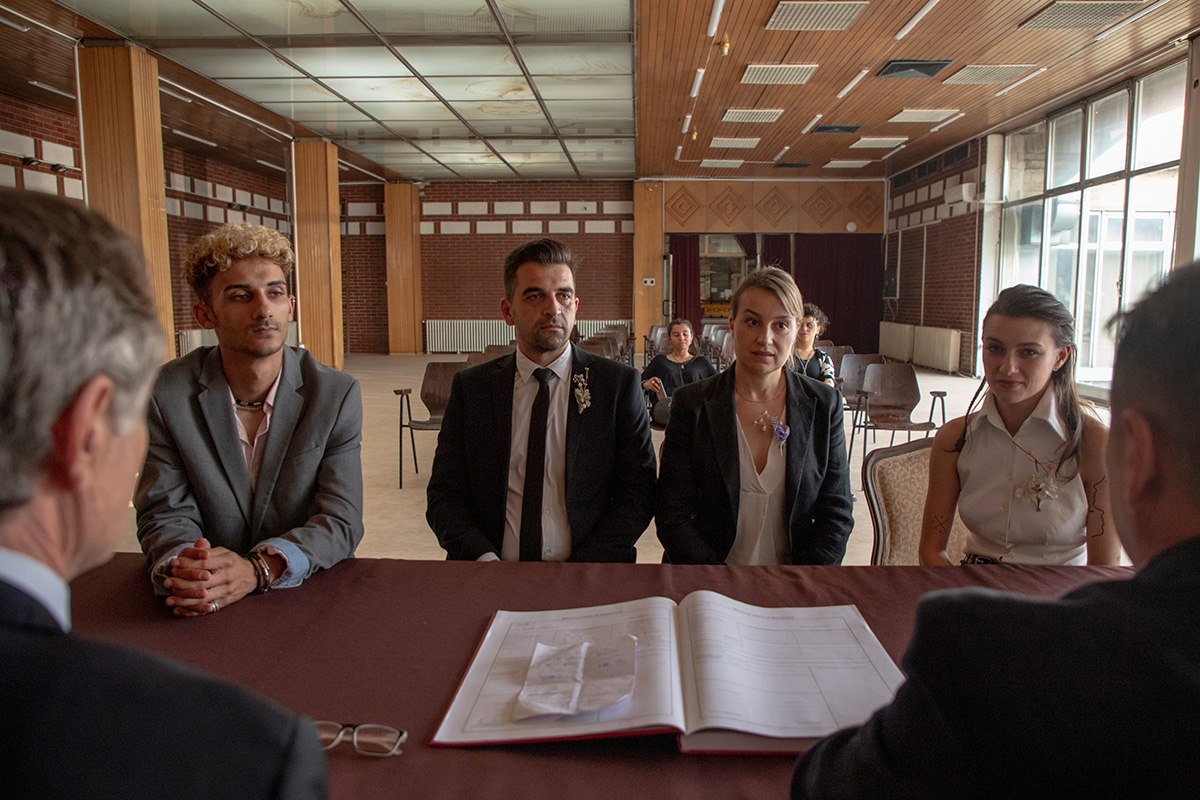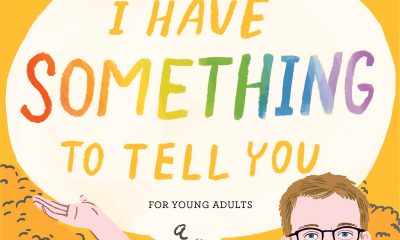Arts & Entertainment
Ellen Pompeo talks about ‘Grey’s Anatomy’s impact on gay fans
The actress says the show ‘is making a difference’


Ellen Pompeo on ‘Ellen’ (Screenshot via YouTube)
“Grey’s Anatomy” star Ellen Pompeo visited “The Ellen DeGeneres Show” to reveal that the long-running series will return for a 16th season. She also explained how gay fans have given her a purpose for continuing the show.
“The first episode I directed, a teenager was in the show and he was gay, and he played a gay character,” she says. “After we had filmed the whole entire episode, he said to me: ’You know, my whole life, I’ve watched this show with my parents, and I’ve sort of used the show as a way to tell my parents that I was gay, and to show my parents that it’s okay, that I’m not different, there’s nothing wrong with me.’”
She continued on that the show helped the teen’s parents “understand what having a gay son meant,”
“I gotta keep doing it, man! We’re touching lives and making a difference,” she says.
Pompeo was also recently honored with the GLSEN Respect Award from the Gay, Lesbian and Straight Education Network. At the end of her interview, Pompeo advocated for Gay-Straight Alliance clubs to be put into more schools.
“GLSEN’s research shows an increase in violence against LGBTQ teens in school—an increase of 65 percent,” Pompeo says. “Something we can all do is set up Gay-Straight Alliance clubs in the schools. There is something we can do to help these kids that the research shows this is effective.”
“If you’re not old enough to vote, that is something that you can do that will make a real difference and really help kids,” she concluded.
Watch below.

Friday, April 26
Center Aging Monthly Luncheon with Yoga & Intergenerational Hangout will be at 12 p.m. at the DC Center for the LGBT Community. Chair yoga will be at noon. Lunch will be provided by the Gay Professional Men of Color at 1 p.m. Guests can bring a beverage of choice. For more information, email [email protected].
Go Gay DC will host “LGBTQ+ Social in the City” at 7 p.m. at Courtyard by Marriott Dupont Circle. This fun weekly event brings the DMV area LGBTQ community, including allies, together for delicious food and conversation. Attendance is free and more details are available on Eventbrite.
Trans Support Group will be at 7 p.m. on Zoom. This group is intended to provide emotionally and physically safe space for trans people and those who may be questioning their gender identity/expression to join together in community and learn from one another. For more details, email [email protected].
Saturday, April 27
Go Gay DC will host “LGBTQ+ Brunch” at 11 a.m. at Freddie’s Beach Bar & Restaurant. Attendance is free and more details are available on Eventbrite.
Sunday, April 28
AfroCode DC will be at 4 p.m. at Decades DC. This event will be an experience of non-stop music, dancing, and good vibes and a crossover of genres and a fusion of cultures. Tickets cost $40 and can be purchased on Eventbrite.
Go Gay DC will host “LGBTQ+ Dinner” at 6:30 p.m. at Federico Ristorante Italiano. This event is ideal for making meaningful new connections and community building or just to unwind and enjoy extended happy hour. Attendance is free and more details are available on Eventbrite.
Monday, April 29
Center Aging: Monday Coffee & Conversation will be at 10 a.m. on Zoom. This is a social hour for older LGBTQ adults. Guests are encouraged to bring a beverage of their choice. For more details, email [email protected].
Tuesday, April 30
Pride on the Patio Events will host “LGBTQ Social Mixer” at 5:30 p.m. at Showroom. Dress is casual, fancy, or comfortable. Guests are encouraged to bring their most authentic self to chat, laugh, and get a little crazy. Admission is free and more details are on Eventbrite.
“5th Tuesdays Open Mic” will be at 8 p.m. at Busboys and Poets at 14th Street, N.W. For two hours, audiences can expect a diverse chorus of voices and a vast array of professional spoken word performers, open mic rookies, and musicians. The event will be hosted by Charity Blackwell. Tickets cost $8 and can be purchased on Eventbrite.
Wednesday, May 1
Job Club will be at 6 p.m. on Zoom. This is a weekly job support program to help job entrants and seekers, including the long-term unemployed, improve self-confidence, motivation, resilience and productivity for effective job searches and networking — allowing participants to move away from being merely “applicants” toward being “candidates.” For more information, email [email protected] or visit thedccenter.org/careers.
Thursday, May 2
Virtual Yoga with Charles M. will be at 7 p.m. on Zoom. This is a free weekly class focusing on yoga, breath work, and meditation. For more details, visit the DC Center for the LGBT Community’s website.
Movies
‘Housekeeping for Beginners’ embraces true meaning of family
Another triumph from young filmmaker Goran Stolevski

Once upon a time in America, queer people sometimes adopted their lovers as their “children” so that they could be legally bound together as family.
That’s not a revelation, though some queer younglings may be shocked to learn this particular nugget of hidden history, nor is it a call to political awareness in an election year when millions are actively working to roll back our freedoms. We bring it up merely as a sort of context for the world that provides the setting in “Housekeeping for Beginners,” the winner of the Queer Lion prize at 2023’s Venice Film Festival, which opened in limited U.S. theaters on April 5 and expanded for a wider release last weekend.
Written and directed by Goran Stolevski – a Macedonian-born Australian filmmaker whose two previous films, “You Won’t Be Alone” and “Of An Age,” both released in 2022, each met with critical acclaim – and submitted (unsuccessfully) as the official Oscar entry for International Feature from the Republic of North Macedonia, it’s a movie about what it means to be “family,” which touches on the political while placing its focus on the personal – in other words, on lived experience rather than ideological argument – and, in the process, drives home some very important existential warnings at a time when things could go either way.
Set in the North Macedonian capital of Skopje, it centers on a social worker Dita (Anamaria Marinca), a middle-aged lesbian, whose house is a safe haven for a collection of outcasts. First and foremost is her girlfriend Suada (Alina Serban), a single mother of Romani heritage, but the “chosen family” in the household also includes Suada’s daughters, teenaged Vanesa (Mia Mustafi) and precocious 5-year-old Mia (Dżada Selim), Dita’s long-term friend Toni (Vladimir Tintor), a middle-aged gay man who works night shifts at a mental hospital, Toni’s new, much-younger boyfriend Ali (Samson Selim), and Elena (Sara Klimoska), an older and more worldly schoolmate of the other girls who serves as a makeshift big sister.
It is, unsurprisingly, a chaotic environment, a sea of revolving situations that largely goes on without Dita’s direct involvement, though she occasionally asserts more authority than she either has or cares to wield. That all changes, however, when Suada is diagnosed with aggressive pancreatic cancer, leading her to extract from her lover the promise that she will be mother to her children when she’s gone.
If you want a spoiler-free experience, you should stop reading now; further discussion of “Housekeeping for Beginners” requires us to reveal that Dita is forced to make good on that promise, even though she’s never had the desire to be a mother, and it’s not just a matter of making sure the kids get all their daily meals and show up for school on time. In North Macedonia, where same-sex relationships are not illegal but are neither granted the validation of lawful protections, the adoption of children requires a woman to have a husband, which means entering into a sham marriage with Toni – who is not quite a 100% onboard, himself – and listing him as the girls’ father. More difficult, perhaps, is gaining the trust of Suada’s two daughters, neither of whom is exactly receptive to the prospect of exchanging their real mother for a half-willing replacement. It’s this challenge that proves most daunting, triggering a crisis that will put every member of this cobbled-together family group to the test if they are to have any hope of hanging on to each other and making it work – something to which Dita finds herself growing deeply committed, despite her initial reticence about taking on the role of default matriarch.
Shot in Stolevski’s accustomed milieu – an intimate, cinema verité style built on handheld camerawork and near-exclusive reliance on close-up framing to capture the awkward blend of comfort and claustrophobia that often accompanies life in a crowded household environment – and leaving most of the expository cultural details, such as the impact of ethnic “caste” and the complicated hierarchy of layers involved in negotiating a peaceful coexistence with “normal” Macedonian society when your domestic and familial structures are anything but “normal”, to be gleaned by context rather than direct explanation. It works, of course; there’s something universally recognizable about the difficulty of “blending in” that helps us bridge the gap even if we don’t quite understand all the fine points as well as we might if we, like Stolevski, had grown up having to deal with them directly.
Even so, there are times when a bit of distance might be missed by audiences in need of a wider scope; it’s hard, after all, to get a palpable sense of space and location when most of what we see onscreen are the upper thirds of whichever cast members happen to be featured in each particular scene. But in case that sounds like a criticism, it’s important to point out that this is part of the film’s magic spell – because by making its physical environment essentially synonymous with its emotional one, Stolevski’s movie delivers its human truth without the unnecessary distraction of learning the ins and outs of a foreign cultural dynamic. The things we need to grasp, we do, without question, even if we don’t quite understand the full context, and what we walk away with in the end is a universally recognizable sense of family, carved in stark relief among a group of people who find it among themselves despite the lack of blood ties or common history to bind them to each other. That makes “Household for Beginners” an unequivocal triumph in one way, at least, because by driving home that hard-to-convey understanding, it manages to underscore the injustice and inhumanity of any world in which the validity of a family is subject to the judgment of cultural bias.
That’s not to say that “Housekeeping” is an unrelenting downer of political messaging. On the contrary, it is lifted by a clear imperative to show the joys of being part of such a family; the humor, the snark, the bright spots that arise even in the darkest moments – all these are amply and aptly portrayed, making sure that we never feel like we are being fed a doom-and-gloom scenario. Rather, we’re being reminded that it’s the visceral happiness that comes from being connected with those we love that matters far more than the rules and judgments of outsiders, which makes the hoops Dita and company have to jump through feel all the more absurd.
Though Stolevski, an Aussie citizen unspooling a narrative based in his country of origin, might not have intended it as such, the message of his film strikes a particular chord in 2024 America. The hardships of Dita and her brood as they try to simply stay together are a clear and pointed warning not to take for granted the hard-won freedoms that we have.
Add to that a superb collection of performances (BAFTA-winner Marinca and first-time actor Selim are standouts among the many), and you have another triumph from a young filmmaker whose reputation only gets more stellar with each effort.
Sports
Bisexual former umpire sues Major League Baseball for sexual harassment
Brandon Cooper claims female colleague sexually harassed him

A fired former umpire is suing Major League Baseball, claiming he was sexually harassed by a female umpire and discriminated against because of his gender and his sexual orientation.
Brandon Cooper worked in the minor league Arizona Complex League last year, and according to the lawsuit he filed Wednesday in federal court in Manhattan, he identifies as bisexual.
“I wanted my umpiring and ability to speak for itself and not to be labeled as ‘Brandon Cooper the bisexual umpire,’” he told Outsports. “I didn’t want to be labeled as something. It has been a passion of mine to simply make it to the Major Leagues.”
But that didn’t happen. Instead of being promoted, he was fired. His suit names MLB and an affiliated entity, PDL Blue, Inc., and alleges he had endured a hostile work environment and wrongful termination and/or retaliation because of gender and sexual orientation under New York State and New York City law.
“Historically the MLB has had a homogenous roster of umpires working in both the minor and major leagues,” Cooper claims in his suit. “Specifically, to date there has never been a woman who has worked in a (regular) season game played in the majors, and most umpires are still Caucasian men. To try to fix its gender and racial diversity issue, defendants have implemented an illegal diversity quota requiring that women be promoted regardless of merit.”
Cooper claims former umpire Ed Rapuano, now an umpire evaluator, and Darren Spagnardi, an umpire development supervisor, told him in January 2023 that MLB had a hiring quota, requiring that at least two women be among 10 new hires.
According to the suit, Cooper was assigned to spring training last year and was notified by the senior manager of umpire administration, Dusty Dellinger, that even though he received a high rating in June from former big league umpire Jim Reynolds, now an umpire supervisor, that women and minority candidates had to be hired first.
Cooper claims that upon learning Cooper was bisexual, fellow umpire Gina Quartararo insulted him and fellow umpire Kevin Bruno by using homophobic slurs and crude remarks. At that time, Quartararo and Cooper worked on the same umpiring crew and being evaluated for possible promotion to the big leagues.
This season, Quartararo is working as an umpire in the Florida State League, one of nine women who are working as minor league umpires.
Cooper said he notified Dellinger, but instead of taking action against Quartararo, he said MLB ordered Cooper to undergo sensitivity training. According to his lawsuit, he was also accused of violating the minor league anti-discrimination and harassment policy.
Cooper’s suit says he met with MLB Senior Vice President of Diversity, Equity and Inclusion Billy Bean — who the Los Angeles Blade reported in December is battling cancer.
The lawsuit says at that meeting, Bean told the umpire that Quartararo claimed she was the victim, as the only female umpire in the ACL. Cooper said he told Bean Quartararo regularly used homophobic slurs and at one point physically shoved him. He also claims that he has video evidence, texts and emails to prove his claim.
But he said his complaints to Major League Baseball officials were ignored. His lawsuit said MLB passed him over for the playoffs and fired him in October. He said of the 26 umpires hired with Cooper, he was the only one let go.
Through a spokesperson, MLB declined to comment on pending litigation. Quartararo has also not publicly commented on the lawsuit.
-

 State Department3 days ago
State Department3 days agoState Department releases annual human rights report
-

 Maryland5 days ago
Maryland5 days agoJoe Vogel campaign holds ‘Big Gay Canvass Kickoff’
-

 Politics4 days ago
Politics4 days agoSmithsonian staff concerned about future of LGBTQ programming amid GOP scrutiny
-

 District of Columbia1 day ago
District of Columbia1 day agoCatching up with the asexuals and aromantics of D.C.












